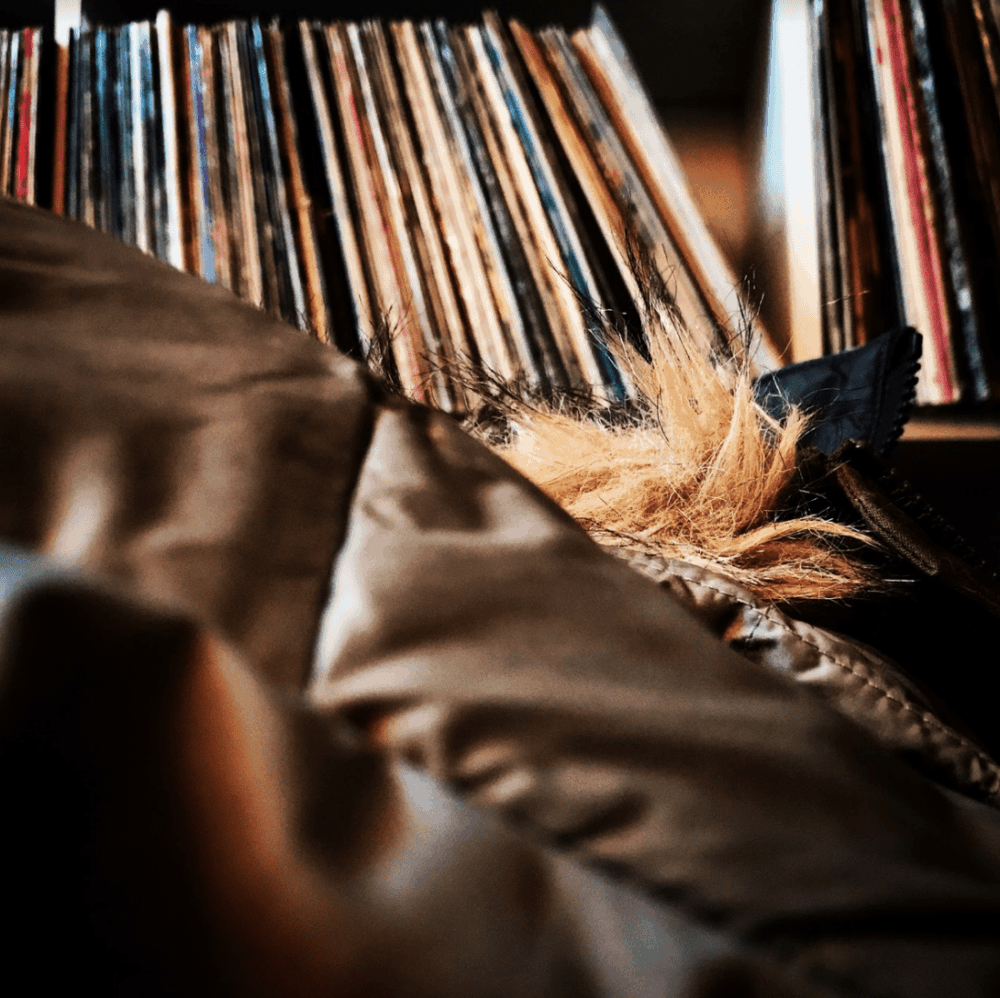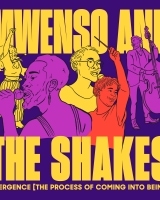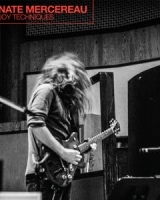Jim Beam

The properties manager Gretchen meets me outside my father’s house. Gives me a long hug. “You look just like him.
A call comes in on her cell phone. She mouths an apology, weathers the person on the other end.
“Can it wait?”
In the city, everything from historical landmarks to zoned tenements get flattened to make way for condos. In my hometown, however, nothing changes. Facades unspool the same old stories, weathering with time. It dawns on me how thoroughly location shapes one’s worldview, that I’ve grown to expect that everything will someday fall.
“I’m so sorry,” says Gretchen, handing me his keys. “I’ll be quick as a squirrel.”
I click our lock for the first time in God knows how long.
No clothing strewn about or used dishware, merely a general clutter. Half a handle of Jim Beam sits on the tray table.
His guitar leans by the back door. I pick it up — perfectly in tune.
Gretchen knocks then enters, beams a smile seeing me with his guitar. “Your daddy and I would sit in the backyard most nights and he’d play. Lovely voice.”
I set it down. “Were you two…?”
“No, no,” she says. “I’m widowed. Lost my Jeremy last fall. Sometimes it’s just nice to have some company.”
“Who was he seeing?”
She raises her eyebrows.
“Sorry if that sounds like an odd question, just.” I glance through the door to his room, to the old wood frame bed, same he always had, the kind that never stops squeaking. “He always had someone, or two, or three.”
“Don’t know about that,” she says, “but he did enjoy talking about your mother.”
I check her expression. She seems genuine.
“You could tell it was painful,” she continues, “but it also brought him joy.” She runs her fingers along her necklace. “We’re blessed to find love in this life, however long the Good Lord lets us have it.”
Hard swallow. “I know you told me over the phone,” I say, “but how did he…?”
“It was a heart attack, dear. His second this year.” She smiles sadly. “I told him to call you after the first one, but you know your daddy. Like a mountain when it came to movement.” She pats the wrinkles out of her blouse. “Anyway. I’ll give you some time. The service is all set for tomorrow and I went ahead and scheduled the reception for my place. You still don’t mind me handling the arrangements?”
“No, yes,” I say, as we shake hands. “Thank you for taking care of all that.”
“My pleasure. He was a good man, your daddy. Had his faults, but don’t we all.”
I wander through the place as though he’ll jump out to bite me. My bedroom’s exactly how I left it, down to the Saved by the Bell mug. His is as orderly as it’s ever been, laundry spilling out of the hamper. The litter box in the kitchen is broken down and stashed against the wall, Bootstrap having paved the path forward.
He should have told me what was going on.
I root myself at the record player. The last album he played was a symphony by Debussy. I drop the needle and the notes drip out like water. He loved music that paints a picture.
It occurs to me that I’m here to pack up his possessions. He never bought the place outright. At some point Gretchen’s going to need to rent it to someone else. A lifetime, within these walls. What’s worth preserving?
A hundred yards down the road, to the local bottle shop. Load up on cardboard boxes. Handles of Jim Beam skirt the floor.
I start with my room, thinking it will be easiest. My concept keeps shifting, however, as to what’s worth keeping. Do I need this or is it just a fond memory? Won’t I still have the memory without the thing itself? I end up with three piles: things I’d be heartbroken to throw in the trash, things important from a legal-slash-logical perspective, and things okay to get rid of. The system dies soon enough, as I start to feel guilty about trashing things that could conceivably be donated, then overwhelmed by the sheer extent of crap I don’t remember. With no end to the process in sight, I start tossing items into piles at random.
Step away. Start with his stuff instead.
Before I’m able to make headway, I unearth old photos of him and my mother. There they are. My parents, before they were parents.
Music was at the heart of their relationship until it wasn’t. They each had talent to spare but zero ambition to make a life of it. They loved music for the music, each other for each other. They had me straight out of high school. I imagine it was a scandal at the time. Folks might have said it would ruin their lives. Now, with both of them gone well before their wheelchair years, it strikes me as foolish to assume I have endless years ahead. What has my time added up to? What am I going to leave behind?
Nolan Buckle, Dot-Dot-Dot.
I need to live before I’m dead.
***
Grey suit. Cream shirt. Grey tie. It doesn’t seem like an occasion for color.
There are a half-dozen people milling about the front of the church when I arrive, Gretchen among them. We exchange a half-wave before a man with a combover and an ill-fitting blazer makes a beeline for me. He shakes my hand weakly, says sorry for my loss, then disposes with the pleasantries to tell me that my father owed him a sum of money, asks what he can expect me to do about it. I tell him I’ve only just arrived for my father’s funeral, can we discuss this maybe afterward, but Combover insists I give him my number. No sooner do I fend off this guy than another steps up with the same situation.
Inside, a familiar face spots me the moment I spot him. “Frank,” I say as he grips my hand.
“Wiley was proud of you, God bless,” he says. “Never explained what you do up there but said you were handling your obligations like a man.”
I end up sitting alone in the front pew, Gretchen directly behind me. I look up at the arched ceiling, the bright windows. Wonder if my father ever stepped inside this church. If I have, in fact, handled anything like a man.
The priest makes it through introducing my father with only a couple factual errors. Gretchen responds to some nonverbal cue and goes to the piano on the far side of the altar. Plays “Tracks of my Tears” — the song my father used to sing to my mother. By the time it’s my turn to speak, my heart’s beating in an unhealthy fashion. It’s not quite grief and not quite nerves, but rather the hapless shock of witnessing a moment that will never repeat itself, knowing that this is the only opportunity to say goodbye and it’s already too late, realizing we’re all just pieces in some infinite chess match, too close to know the greater strategy.
A dozen people, at most, in this church that seats two hundred.
“Feels like I’ve been to a lot of these lately,” I say, immediately starting in on a string of words I hadn’t planned on saying. I admit that it feels strange standing up here. That, yes, I’m his son, who else would deliver the eulogy, but we hadn’t talked in forever. That it’s somewhat of a shock that he got to the end of his life and the only people to attend his funeral are the ones he owed money. Awkwardly, I extend my hand in mock blessing. “May we all die in somebody’s arms and free of debt.”
No reaction.
“Wiley Buckle was the kind of guy who could light up a room,” I continue. “Trouble was, he rarely turned up in the rooms he was supposed to.”
Again, nothing. I stare down at my chicken-scratch rewrite from 5 a.m. this morning, wondering why I thought joking was a viable idea. The silence stretches on, and, naturally, it’s a non-silence. People breathe and shift. The church walls creak. Someone’s cheap watch beeps the hour. I tuck the eulogy into my pocket.
When I find my voice, I tell them that my father was generous to a fault. That he loved making people laugh. That he taught me to be self-reliant, to stand behind the decisions I made. “For all his faults, when my father said something, you knew it was coming from somewhere honest.”
His casket. His body. His voice, silenced forever.
“When my mother was dying,” I say, “we were both grieving in our own way. I haven’t thought about it for years, but he sat every day in the hospital with me. Must have been weeks, we sat next to her. It couldn’t have been easy for him, taking that time off work.”
I look out.
“These are things you don’t think about as a kid. Like when he took me to the pound to get a dog and told me not to pick a young one. He said, pick one that everybody else has counted out of this life, and we’ll give him a home. So we did. We took care of him when he got sick. My father made it to every vet appointment. There was never a question in his mind. We brought Artie into our family, and you don’t give up on family.”
Gretchen bows her head.
“I gave up on my dad,” I say. “I didn’t know how to fix him and it made me so angry. When we talked, it was like we were having two separate conversations.”
I look down at the wood box who raised me.
“I wish you could have taught me the right words to get through to you. Or maybe I just had to learn how to listen.”
A sunbeam hits the stained glass, casting colors across people’s faces. Magentas and purples and yellows.
I say something about life and death and time, discovering then forgetting the words as they’re spoken. How none of us has any control except for the smallest thing — we can decide whether or not we show up for things.
To these strangers, I confess that in my life I have not been a person who’s shown up. That time and again I’ve dug into my bunker without a thought as to what the rest of the world might need. My chest tightens. The Bible up here must weigh twenty pounds.
“My dad was there when it counted,” I say. “It wasn’t easy for him. Partly because he made it that way. But he was there.”
Frank nods, offering a prayer to the ceiling. Combover checks his Casio, clearly over it. Kitty’s up north instead of in the front pew beside me.
She’s happy there. She’s safe. She’s where she belongs.
On some level she was running from the marriage we’d become, but more to the point she was running to a better situation.
The distinction does matter.
I could have listened. I could have communicated. I thought there’d be more time.
These strangers sitting before me. The absence my father’s left. There’s no guarantee that any of us will make a lasting impression on the world.
God, I could use a drink and it’s the absolute last thing that I want.
“Thank you for not killing me when I was a helpless kid,” I say to my father by way of farewell. “Or a know-it-all teenager, or an utterly clueless adult.”
Breathe, and there will be life.
“I forgive you. Rest in peace.”
***
The reception consists of Gretchen, myself, and far too many supermarket cheese platters. Her home is filled with knick-knacks and furniture designed for grandchildren. She tells me that she knows the men who came to the service and that “their breath is worse than their bite.”
Our conversation sprawls. I don’t learn more about my father, necessarily, but am reminded, more than once, of the connections between us.
When I rise to go, she takes my hand. Closes her eyes. Prevails upon God, her late husband, and my father to all watch down on us. Then she walks me to the door where we share a final embrace. She’s the type of hugger who leans with her full weight, the kind to hold a person without a hint of trepidation, all warmth and understanding.
Packing up my father’s home ends in a stalemate. I slide open the back door and settle there with his guitar. Moss overtakes the banister. My hands slide over a simple chord progression — something I’m sure I’ve heard but can’t trace back to a single song. My mind floats to Kitty. The ways we grew together and apart. The Jim Beam’s inside, beckoning with its lethal sweetness.
An idea rises from nowhere, ludicrous as the sun.
I stalk back into the house, locate my keys, and head out to the rental car, which is parked beside my father’s truck.
The bank’s preparing to close when I arrive but I’m able to prevail upon their mercy.
“How much did you want to withdraw?”
The teller’s expression, when I answer, belongs on television.
“You can check the account,” I say.
“There are sufficient funds,” he says, “it’s just not often we hear that kind of request.”
The teller checks with his supervisor, who checks with hers. Finally, the machinations move in my favor, and I’m handed a disarmingly thin envelope.
Pulling into the cemetery, it takes twenty minutes to locate my father. The whole progression from earlier is a blur. The service to the cemetery to snacktime. Movement is not a panacea. Sometimes you need to stop and acknowledge.
I stand over his plot, Jim Beam in hand. Branches sway above us, birds resting, straight out of a cliché movie. I sip from the mouth of the bottle, then pour the rest out over the dirt.
Back to Gretchen’s. I park on the curb and find a pen in the glove box.
For the funeral and his debts, I write on the envelope. If there’s anything left over, keep it. Thanks for being his friend.
I slip it under her door and hit green lights the whole way back to the house.
Donations go in one pile, trash in another. I load his full collection of records — numbering in the thousands — into the flatbed of his truck, which I’ve only just realized is mine now
The backyard summons me. In the summer, the pale blue night lasts forever. Fireflies circle. The guitar and I come together. Words arrive from on high to fit the melody.
[Next week: The final episode of My Life on Rye.]
—
This piece appears as part of a serialized fiction experiment by Nathaniel Kressen for At Large magazine. New installments are published weekly, each based around a different liquor.
Nathaniel Kressen is the author of two novels — Dahlia Cassandra (named Best of 2016 Fiction by Entropy & Luna Luna Magazine) and Concrete Fever (Bestseller, Strand Book Store) — as well as the co-founder of Second Skin Books and the leader of the Greenpoint Writers Group. He was commissioned by At Large magazine to publish his third novel in serialization — now available, with new chapters publishing weekly — titled My Life on Rye. And, as one half of the wife-and-husband team Grackle + Pigeon, he recently published the perfect gift for the young and young at heart with Blanket Fort: Growing Up Is Optional (HarperCollins/Morrow Gift). You can find his work at nathanielkressen.com.

